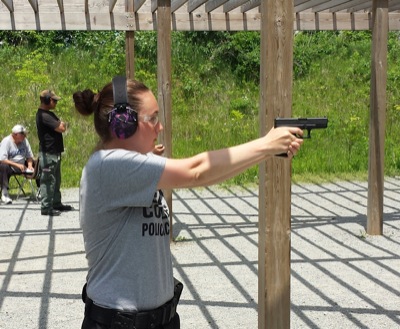Tuesday, June 2nd, 2015
Police academy leaders critical of proposed changes
Commanders: Mandates will hamper officer recruitment
By Kathy Thompson

Submitted Photo
Brittney Wyerick, of Celina, last week takes target practice at Rhodes State Police Academy in Lima. Leaders of local police academies oppose tougher new standards being proposed at the state level.
ST. MARYS - Commanders of two local open-enrollment police academies say proposed changes could make it difficult for potential officers to afford the training and for smaller departments to hire qualified employees.
The changes could make it particularly difficult to find special deputies or reserve officers who work for free, they said.
"We were pretty shocked and surprised when we first heard of all this," said commander Rick Kohli of the Rhodes State College Police Academy in Lima, who has been a police officer for 33 years. "We weren't invited to the table to discuss any of these issues. But now that we're aware and attending the meetings, we are very concerned that these new requirements are going to keep us from getting good police officers on the streets."
Students at open-enrollment academies, such as Rhodes State and Wright State-Lake Campus, pay for their own training. The students have not necessarily been hired by a department before entering the schools.
Kohli and commander Mark Ernst of the Wright State-Lake Campus Police Academy, who has been an officer for 28 years, are upset Attorney Gen. Mike DeWine and Senate President Keith Faber, R-Celina, are backing House Bill 204, which would increase the number of hours for basic training and require all officers to have at least a high school diploma or GED and be at least 18 years of age.
The additional requirements would increase the academies' costs, which would be passed on to students, Ernst said. "Many of those students, especially those with lesser economic means, will not be able to afford it," Ernst said. "According to what I know, these costs are not covered by financial aid."
"Most police departments conduct extensive background investigations into the people they are thinking of hiring," Ernst added. "Most if not all the items mentioned that could be mandated will then be conducted again. While I agree, extensive background checks are necessary and to have standards to enter the academy, I think it's going to be costly and should be done prior to someone being hired at a department, not at the academy. Again, those people who have limited funds will be prevented from even considering becoming a police officer."
Kohli agreed, saying students who also work other jobs may not be able to afford the increased cost.
"It's too much," Kohli said. "Granted, not all of those cadets make it. Some of them shouldn't make it. But don't make it harder on the little communities and the people trying. And that is exactly what this is going to do."
Many graduates are hired by local police and sheriff's departments, Ernst said. Some go on to become auxiliary officers or work part-time or volunteer, he added.
"I think if they make getting into the academy financially harder, then they're going to decimate little departments like New Bremen or Minster," Ernst said. "I'm hoping that by the middle of June I'll have five auxiliary officers but if this goes into effect, it could make it hard to get those officers."
Tyler Kraner, 22, Van Wert, recently graduated and is a reserve with the St. Marys department and a part-time auxiliary officer with Spencerville. He said it was rough working full-time, pursuing a criminal justice degree at the Lake Campus and attending the police academy.
Kraner said the academy's eight months of hard work and $3,000 cost "definitely took its toll," financially and mentally.
"But if it's what you really want, then you'll get through it," Kraner said. "This is something I've always wanted to do and I'm hoping to someday go to the federal level. You are either passionate about this or not."
Kohli takes exception to the suggestion the academies are not tightly monitored.
"We're all trained here," Kohli said. "Now they're telling us they don't trust us or how we are teaching the classes. The state already has compliance officers that can come out here at any time and check on us. But if they are wanting a compliance officer to check on every subject of every class, well, that's going to cost because they're going to be hiring a whole bunch more of them."
A compliance officer already ensures cadets meet gun-range qualifications, he said.
"But if they want to come and make sure every student drives the car on the course the way we've taught them, that's going to take more days and a lot more time," Kohli said. "Where's that money coming from? And they've always been able to come to the academies to see that we're compliant. What's the fuss now? I'm sorry, I believe that if it's not broke, don't fix it."
"Of course, neither of us are saying there aren't people out there who shouldn't be officers," Ernst said. "But don't make it impossible for the towns like mine to get good officers by implementing rules on them that shouldn't be there."
Both men said changes are welcome and expected as long as they are reasonable, understandable and necessary.
"But don't make it difficult," Kohli said. "Or impossible."
The proposals came after Gov. John Kasich earlier this year put together a board to make recommendations regarding lethal force, training and community-policing policies. Kasich said his board was assembled because of violent reactions to police shootings in Ohio and other parts of the country.
At a meeting of the Ohio Peace Officer Training Commission on Thursday, discussions included increasing advanced training for officers from four hours annually to 40, creating evaluations for training academy instructors, increasing academy training hours, making academy instruction more uniform and possibly adding annual requalification training on use of force.
Under the legislation, academies would need to screen candidates for psychological or drug problems, perform polygraph and criminal background checks and give a physical fitness test.
The Ohio Peace Officer Training Commission now requires 582 hours of training. Rhoades State's program includes 600 instructional hours, while Wright State requires 650 hours with an additional 30 hours for rifle, pepper spray and Taser qualifications. The extra training is not required by the state.
Cadets pay about $3,400 to attend an open-enrollment academy.
Background checks are performed by both the Federal Bureau of Investigation and the Ohio Bureau of Criminal Investigation, Ernst said. Wright State also requires a physical test.

